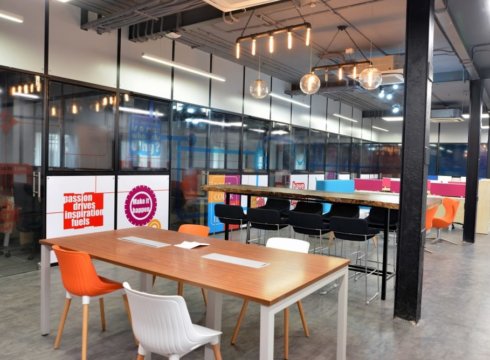Inc42 Daily Brief
Stay Ahead With Daily News & Analysis on India’s Tech & Startup Economy
New age businesses in India are witnessing a revolutionary shift in office space dynamics driven by cost optimisation strategies as well as solutions to cater to a younger workforce. For long however the Indian commercial real estate market was restricted to larger office set-ups, with huge fixed costs and lengthy lock-in periods. But the advent of millennial workers combined with a growing entrepreneurial culture is triggering demand for ‘Flexible’ and ‘Smaller’ real estate alternatives.
Startups and SME’s continue to bet big on India’s growth story, scaling up their workforce faster than ever before. But how do these companies find office spaces that are budget friendly, flexible and tailor made to suit their requirements? Business owners are slowly adapting the idea of collective working or Coworking, which enables them to share not only physical workspace, but also ideas and synergies. Coworking in essence provides innovative office space solutions without making huge investments in large format properties in anticipation of future manpower expansion.
For corporates and large businesses, the challenges are different. Urban congestion, long distances, increased travel time; pressures to reduce capital and operational expenses and challenges of retaining top talent have led to an increase in telecommuting and remote working. The odd even rule implemented in Delhi where vehicle owners can ply on roads only on alternate days is another example of commute challenges. Working from home or remote locations like cafes, hotels, airport lounges, etc can have its own set of challenges. Lack of control over surroundings, limited access to facilities like internet and printing, as well as difficulty in monitoring employees and weakening productivity is compelling businesses to rethink their operational best practices. This has led to employers turning to flexible and agile working solutions in the form of Coworking.
In addition, Coworking firms bridge the gap between demand and supply through fully fitted centers, which provide members with necessary amenities such as high-speed internet, scanners – printers, meeting rooms with audio – video capabilities, multiple seating options, complementary food and beverages, parking space and mail – handling facilities. The virtual address concept where an owner provides an individual the permission to use the address virtually for business purposes is another important aspect of Coworking.
New age Coworking firms enable employers to analyse building access patterns, internet and printing usage, collaboration zone interactions and interaction through access cards, CCTV, and POS. The access to big data allows corporates and startups to map and analyse employee trends that can be beneficial for enhancing productivity and engagement. Big data analytics in Coworking provides empirical evidence on workspace trends, which can determine how offices of the future are designed.
Currently, 17% of India’s Grade A office space is lying vacant with the same statistic being 27% in Delhi and 20% in Mumbai. Coworking is a great business opportunity that can help monetising under-utilised commercial spaces across retail and hospitality set-ups. There is a huge opportunity for aggregation of under-utilised real estate spaces by converting them into Coworking centers. With planned operations and timely execution of projects, Coworking firms can deliver high quality solutions for both space owners as well as end users.
Crowd sourcing is another trend that will promote Coworking culture next to residential hubs, providing an activity based productive work environment and leveraging the network effects of people who form a community where the owners and consumers of space co-exist.
Coworking, as a concept, has emerged as a game changer in the real estate market globally. Today there are over 10,000 Coworking centers with a 5 million plus members in India. Asia in fact is the biggest Coworking market in terms of members. Worldwide, Coworking centers have seen a 36% surge in member base and these numbers are growing by the minute. The freedom to choose one’s workplace, ease of interactions with peers and the gamut of services offered by Coworking spaces is contributing to this growth.
There is a huge opportunity to create a network of managed work spaces in prime destinations across all major metros. The anytime, anywhere network of spaces is here to stay and co-working firms need to come up with out-of-the-box offerings that appeal to the young and aspirational Indian workforce.
Note: We at Inc42 take our ethics very seriously. More information about it can be found here.


